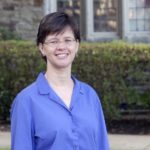This project revolves around doing the necessary research to create a curriculum based on engaged learning in order to advance Urban Studies pedagogy through experience.
This project was focused on reconfiguring the senior seminar for Urban Studies majors in the Urban and Community Health Concentration. Professor Hotz wanted to create a structure to encourage students to produce works of engaged scholarship for their senior projects. She surveyed literature on engaged scholarship and on engaging students in research, and also conducted extensive conversations with faculty in the program, especially Elizabeth Thomas and Peter Hossler, who actually teach the senior seminar. Very soon afte beginning the project, the program faculty realized that a reconfigured senior seminar called for a new curriculum to support it. To get students to the point where they are ready to produce engaged scholarship, the program needed to develop a program that is deeply integrative of academic skills and community involvement.
Backward engineering a curriculum in this way led to the following insights:
- To create scholarship of this nature, students need methods courses in both quantitative and qualitative research. They also need to be immersed in the literature about and experiences of marginalized communities, especially communities of color. These are “mid-way” courses that students should take in the junior year.
- To make use of their research methods in meaningful ways, students need to be embedded with community partners and they need a critical framework for understanding the work of these partners. This means that in addition to an introductory course, they need an internship or field experience as a gateway rather than a capstone. These courses should be taken as soon as the student declares a major.
- The broad framework of the major moves students from integrative gateway experiences (internship and introduction) through mid-way courses in method and critical discourses, and concludes with a senior project of engaged scholarship. Within that broad framework, students need room to specialize in certain content areas such as policy or population health.
Where the project now stands:
- The Urban Studies program now offers two senior seminars when we are able so that Urban and Community Health students are grouped together.
- Students are encouraged to pursue community engaged projects.
- Urban Studies has begun making more robust use of student research assistants in the summers and are establishing funded summer fellowships that afford students the opportunity to build up data sets that will be useful for senior projects.
- The program has clarified that projects produced in collaboration with faculty members are accepted and valued as senior projects.

Kendra Hotz
Associate Professor of Religious Studies
Dr. Hotz coordinates the Urban and Community Health concentration in Urban Studies and studies the relationship between religious belonging and health seeking behaviors. She serves as the Robert Waller Chair of Population Health.
